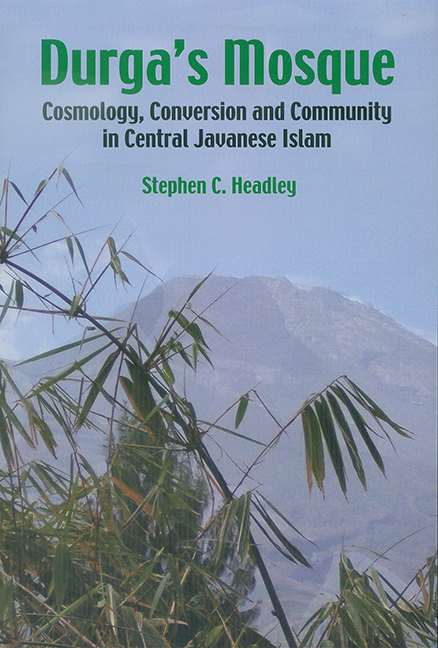Book contents
- Frontmatter
- Contents
- List of Figures
- List of Tables
- Preface
- Acknowledgements
- Introduction: Cosmology, Conversion and Community in Javanese Islam
- PART I THE SOCIOLOGY AND PRACTICE OF RELIGION IN CENTRAL JAVA
- PART II RECONSTRUCTION OF LOCAL RELIGIOUS HISTORY
- PART III INVOKING THE COSMOS, MAGNIFYING ALLAH: STRUCTURING A LANDSCAPE IN THE SEVENTEENTH TO NINETEENTH CENTURIES
- PART IV COSMOLOGY, CONVERSION AND COMMUNITY IN CENTRAL JAVANESE ISLAM TODAY
- Bibliography
- Index
- About the Author
- Frontmatter
- Contents
- List of Figures
- List of Tables
- Preface
- Acknowledgements
- Introduction: Cosmology, Conversion and Community in Javanese Islam
- PART I THE SOCIOLOGY AND PRACTICE OF RELIGION IN CENTRAL JAVA
- PART II RECONSTRUCTION OF LOCAL RELIGIOUS HISTORY
- PART III INVOKING THE COSMOS, MAGNIFYING ALLAH: STRUCTURING A LANDSCAPE IN THE SEVENTEENTH TO NINETEENTH CENTURIES
- PART IV COSMOLOGY, CONVERSION AND COMMUNITY IN CENTRAL JAVANESE ISLAM TODAY
- Bibliography
- Index
- About the Author
Summary
What's in the umma? The umma is not a congregation (jamā’a, Arabic; jemaah, Indonesian) of a given mosque, but the entire community of faithful. For the word umma (Ind. Jav. umat) there can be no translation into English, only a paraphrase for an attempted definition. Can an umma be localized, that is to say, does it have boundaries, whether ethno-linguistic, national, or otherwise? Can we write a book, for instance, about the Javanese umma as a vector for the introduction of individualism in Java? There certainly is an umma in Java, but clearly it is not only made up of Javanese. Recently, the leader (penghulu) of the largest mosque in Surakarta (Central Java) came from the eastern island of Sumbawa, and no one found this unusual. Indeed, the umma is cosmopolitan. Does this mean that the umma is as ethnically varied as the entire Indonesian archipelago? Should we include in it the Muslims of Malaysia, Sulu (the Philippines), and Petani (southern Thailand)? If one begins to think in terms of a transnational virtual umma, it often becomes so vague, that locality disappears as a pertinent marker of identity. In this study, we are committed to describing the development of the umma of a given area, Kaliasa. Central Java is the historic heartland of the island and our focus precludes a broader comparative perspective.
Arjun Appadurai (1996, ch. 8) pointed out that ethnographers have long been occupied with studying how local subjects are produced by particular rites of passage. But the “local” umma in Central Java has become over time, since 1660, less and less preoccupied with incarnating locality, with taking over the social space and clientele of older “Javanese” deities like Durga. In the course of eighteenth century, this network of mosques spread from city to city and then out into the countryside once royal patronage became a burden as much as an advantage. The urban mosques and rural Koranic schools, began to realize that their teachers who had studied in Medina and Mecca and their faithful who had done the h. Ajj (Ind. haj), were much less motivated in incarnating local identity than in propagating a renewed vision of what it meant to be a Muslim based on contacts with currents of Muslim thinking in the Middle East.
- Type
- Chapter
- Information
- Durga's MosqueCosmology, Conversion and Community in Central Javanese Islam, pp. xv - xviiiPublisher: ISEAS–Yusof Ishak InstitutePrint publication year: 2004



